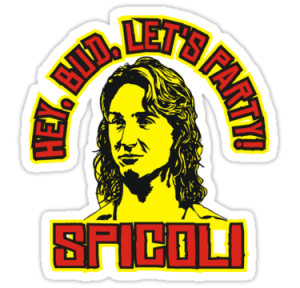Addicts often become the way they are because they suffer from severe social anxiety. To carry on in a large group setting is as painful as having a leg sawed off while wide awake.
I know the feeling very well.
Item: It’s December 2001 and I’m at the home of the big boss for the annual Christmas party. I skipped out on this celebration a year earlier because talking to co-workers about anything other than the work at hand terrified me. I came up with a good excuse, though I can’t remember what it was. I couldn’t get out of two in a row, so off I went with Erin to the party. For the first hour I stood there like a stone, not knowing what the hell to say to these people, many of whom I was butting heads with at the office.
I’m offered a glass of wine. I suck it down in two gulps and start to loosen up. So I have another. And another. And another. Conversation becomes easier, so I have another.
I walk away realizing that enough alcohol will numb that itchy, edgy feeling I get around people. So getting drunk becomes standard operating procedure.
After awhile, the social settings are no longer enough. I need to numb myself every moment of every weekend, then every night after work. When I’m back on the newsroom night desk I stay up late on Sunday nights watching TV. Wine is a necessity, followed by a nice food binge.
Item: I leave that job and go to a company full of young, just-out-of college party hounds. The company likes to have long offsites where the free booze flows like tap water. Being an addict, I make sure to get my fill, followed by my fill of food. There’s nothing quite like a food binge when you’re drunk. For someone like me, it’s heaven for the first hour, followed by shame and terror over my utter loss of control. I gain up to 50 pounds in this job as I binge my way through the social discomfort I feel in a setting like that.
Item: It’s 2009 and I’m several months into my abstinence from binge eating. I’ve dropped 65 pounds on the spot and my head is clearer, but the defect in my head is still there, so I go looking for other things: Wine — lots of it. It becomes a necessity every night with dinner. I get itchy when the supply is cut off. By Christmas I realize wine is no longer compatible with a clean life — the kind I have to live, anyway. So I take my last sip on New Year’s Eve and put it down.
Two things are worth noting here:
1. I was never a fall-down drunk. There was always a line I refused to cross, to that zone where you become stupid and incoherent. But I needed to have some. Not having some led to that feeling like your skin is either two sizes too loose or too tight. The OCD behavior worsens, and I’m twitching, pacing and bouncing off walls and furniture until I have some. THAT is addiction. You don’t have to be smashed and stoned 24 hours a day to qualify. All you need is that unquenchable thirst; the kind that drives you mad until it’s fed.
2. My need to fill the hole in my soul with food and drink has almost always been connected to social anxiety. It’s not just the big work party settings. It’s the small family settings, where I feel the pressure to say something useful every two minutes. I stopped drinking and binge eating, but other crutches have emerged to take their place. I stare at my Android phone or flip through a book. I break off and take walks to be alone for a few minutes. I don’t think it’s awful behavior. It’s certainly better than what I used to do. But it goes to show that you never heal 100 percent.
I’m much better with people settings than I used to be. One reason is that in recovery I’ve come to enjoy people more. I even enjoy watching a little dysfunction.
I can speak in front of a room full of people and often do for work. That’s better than when I would be terrified to do so. I can certainly express myself in writing in ways I could never have done a few years ago. But when I’m at a family gathering or with friends I haven’t seen in awhile, the social anxiety still sets in.
I know a lot of people with social anxiety. Some think they are freaks. Others think they’re either too intellectually inferior or superior to those they are with. Others don’t beat themselves over it. It simply is what it is.
The key is wanting to get better, then doing whatever it takes to get there.
I’m better, but I still have a lot of work to do.
It’s like they say in the halls of AA and OA: I’m not yet the person God wants me to be, but I’m not the person I was, either.
Progress is progress.







